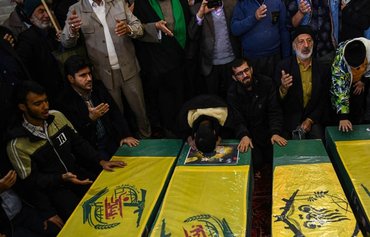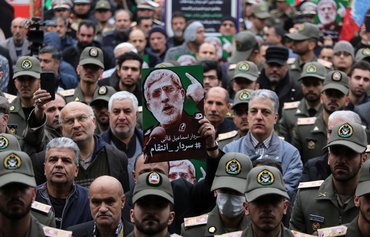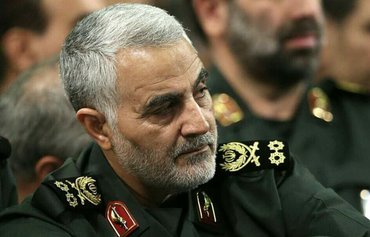Before he was assassinated in January, Islamic Revolutionary Guards Corps Quds Force (IRGC-QF) commander Qassem Soleimani was overseeing the establishment of a new armed entity in Iraq, Iraqi military experts said.
This project had a regional dimension, related to Iran's involvement in Syria, Lebanon, Yemen and elsewhere, and would have posed an even greater threat to Iraq's stability had it come to fruition, they said.
Soleimani's killing put a stop to the project, they added, but it still has the potential to pose a regional threat.
According to various media reports, the new entity was to be a militia comprised of elements hand-picked from several other Iran-aligned militias and formed into elite forces that operate under the name of the Islamic Resistance Army (ISRA).
A senior Iraqi official in Baghdad, who asked not to be named because of the sensitivity of the information, told Diyaruna the new entity was one of the last projects Soleimani worked on before his death.
It involved the selection of elements from several Iran-linked militias, including Harakat al-Nujaba, Kataib Hizbullah, Asaib Ahl al-Haq, Sayyed al-Shuhada, al-Abdal Movement and Saraya al-Khurasani, the Iraqi official said.
These fighters were to be assembled into an elite force that was to form the basis for a new armed entity, the official said.
They were to be prepared for this new role by receiving military training on the use of various types of weapons, including rockets and missiles, from trainers from the IRGC and Lebanese Hizbullah.
The Islamic Resistance Army was to comprise between 2,500 and 3,000 fighters, and their missions were to extend to Syria, Lebanon and potentially even Yemen, the official said.
It was to be a cross-border group under the direct command of Soleimani and slain Popular Mobilisation Forces (PMF) deputy Abu Mahdi al-Muhandis, he said.
After Soleimani and al-Muhandis were killed, the name circulated as the commander of the new entity was that of IRGC officer Majed Mazaal al-Tarfi, who is active in the Syrian arena as one of the co-ordinators of the militias.
'We hope the project will not be revived'
The Iraqi official told Diyaruna that preparations for the new entity were being made at the highest levels of the Iran-aligned militias, and there was even a plan to establish a satellite TV channel to serve as its mouthpiece.
"But Soleimani's killing brought all those preparations to a halt, and we hope the project will not be revived," he said.
The removal of Soleimani spared Iraq a scenario of imminent security turbulence, he added, but concerns remain that the IRGC-QF commander's successors may decide to push on with the project.
He pointed out that the project falls within the framework of Iran's attempts to weaken the Iraqi army and extend the influence of Iran-aligned militias in Iraq, so as to weaken the state and the rule of law.
Future Iraqi Constitutional Party chairman Entifadh Qanbar told Diyaruna the decision to assassinate Soleimani was a "sound decision" and a gift to all peoples in the region who aspire to live a dignified and free life.
This decision is validated day after day, he said.
"Forming new militias is the only thing Iran has mastered over the past years," he added, which is why news of a new militia came as no surprise.
"It is rather a confirmation that Iran is continuing to defy the international community and international norms and laws," he said.
He pointed out that Iran-backed militias operate in Syria, Iraq, Yemen and Lebanon, with terror cells operating in the Gulf, in addition to boats transporting weapons and explosives.
Militias fuel resentment against Iran
"Soleimani's project, summed up simply, is the establishment of a new group to kill Iraqis and threaten the security of Iraqis using Iraqi money," Civil Democratic Alliance member Firas al-Daini told Diyaruna.
But Iraqis are more aware of Iranian scheming now, he said, noting that the formation of this militia will only fuel public resentment against Iran.
It will make it clear that the Iranian regime is targeting their security and stability, he said, and that it is working against the efforts being made to restrict the possession of weapons to the state and strengthen state institutions.
Iraqi security expert Fouad Ali told Diyaruna that Iran's push to create more militias is also aimed at discouraging any country thinking of helping Iraq or playing a role in its internal affairs, which gives Iran's plans a political dimension as well.
Ali said Iran also has used the militias to secure its economic interests and seize control of state resources.
The large number of these militias, which operate under various names, are intended to frustrate any effort to bring them under control in the future, he said.

![A picture taken on June 20th, 2018 shows a propaganda billboard for the pro-Iran Kataib Hizbullah militia in the centre of the Iraqi capital Baghdad. [Ahmad al-Rubaye/AFP]](/cnmi_di/images/2020/05/19/24113-Pro-Iran-militias-600_384.jpg)






